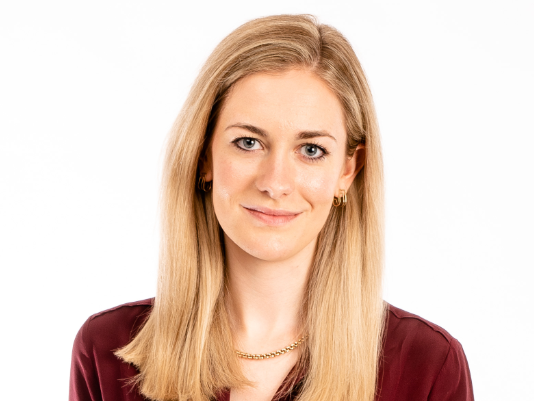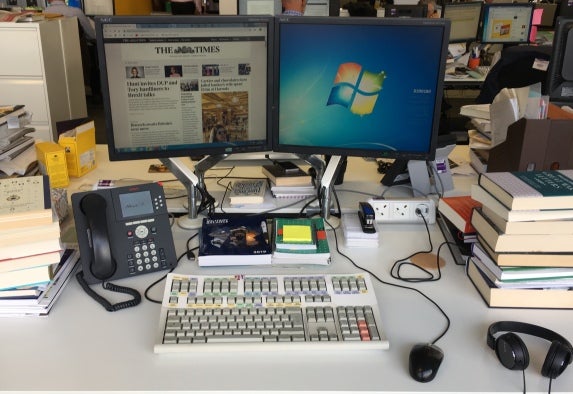
Times defence correspondent Lucy Fisher, 30, tells Press Gazette about her first big break in her eight-year journalism career, her regret that she didn’t learn shorthand from the off and the dangers of the Twitter echo chamber…
What is the one thing you couldn’t do without as a journalist, and why?
Curiosity. You need to approach every subject from an inquisitive perspective and think of the questions to which you personally want answers. Good instincts are another requirement – for when people are telling the truth, and when a “scent” is worth following.
What made you want to become a journalist?
A desire to explore the world and continue learning about new things, coupled with an inability to tolerate tedium. People complain about the vagaries and instability of the industry, but I still think that working in news is the best job in the world. I don’t think I could do anything else.
Where did you study journalism?
I didn’t – I learnt on the job, making a fair few mistakes along the way. Advice and encouragement from some well-established journalists helped rally me along though.
I barely knew anybody in media in those early days, so I wrote to a handful of correspondents I admired and was delighted that making contact out of the blue tended to be well-received.
Where did you catch your first break?
Clinching the Anthony Howard Award in 2013 was an important break. It entailed a paid fellowship writing about politics for three publications over the course of a year.
I loved every moment, but particularly being at The Times and working alongside its quick-witted, fast-paced and tight-knit politics team. I was delighted to convert my stint there into a job on that team.
I spent four years covering politics before moving to defence last autumn.
What was your first paying journalism job?
The Sunday Times was my launch pad. I started off there doing unpaid work experience, supplementing a pretty ascetic lifestyle by tutoring in the evenings and weekends while I gradually clawed my way into the system.
Bit by bit, I won paid commissions to write articles for all parts of the paper – ranging from foreign news, through features, to business. Eventually that became a full-time job.
What is it you enjoy most about journalism?
The people – both those you work with and those you encounter as a reporter. Journalists are fantastic company – clever, funny and irreverent.
In the course of the job you also meet every sort of person facing every kind of situation that life can throw up, from the most grotesque challenges to dizzying triumphs. That role as a front row observer gives you a unique perspective on the human condition.
The travel is another benefit. In recent months I’ve reported from Afghanistan, Ukraine, Israel and the Arctic Circle. Visiting places I would never otherwise go – whether in the UK or further afield – is a great privilege.
Away from work, which newspapers, TV or radio news do you consume and why?
I have fairly eclectic tastes. Of course I read a lot about defence, security and international affairs for work, while outside of that my primary interests are British politics, policy and economics.
As well as filleting the papers each day, I tend to pick up Private Eye, The Spectator, The Economist and New Statesman. I also watch and listen to all the major politics shows across the BBC and Sky News.
When I have a bit more time I enjoy the London Review of Books, The Atlantic, New Yorker and Times Literary Supplement. I’m also a big fan of documentaries – I usually turn to the independent productions under the BBC Storyville umbrella or Netflix.
What piece of work are you most proud of, and why?
Breaking stories that have a real world impact on policy and changing people’s lives for the better is what makes me tick.
This month I had a front-page scoop about the Government’s policy on torture, which was taken up in the Commons. It forced the Defence Secretary to launch a review of it.
I’ve also written in recent months about the Government’s poor treatment of Commonwealth personnel in the British military, revealing that soldiers are having to moonlight in second jobs to earn enough money to bring their spouses and children to the UK under draconian visa rules.
The story sparked a debate and questions in Parliament and the Prime Minister has had to meet with an MP and charity chief who are now campaigning to overturn the policy. It isn’t fixed yet, but I’m confident that growing pressure will force a revision.
What’s your biggest mistake / regret in your career?
That I didn’t learn shorthand at the outset. It’s remarkable how long you can survive without it.
What’s the most outrageous thing you’ve witnessed in a newsroom?
An exuberant former colleague purchased a trampoline for the office, which made for some amusing tableaux. Sunset seemed to have fallen on the legendary excesses of Fleet Street, however, long before I arrived on the scene. I’ve never seen objects hurled in anger or monstrous drunkenness or debauchery.
If you could change one thing about the UK media industry today, what would it be?
Twitter can be useful to follow breaking developments and to share links to interesting articles, but its echo chamber effect corrodes a vibrant, independent-minded, multifarious media.
Orthodoxies take hold more quickly in this strange online subculture that has grown up.
Any top tips for aspiring journalists?
Work hard, go the extra mile to impress potential future bosses and hang on in. It isn’t easy to catch a first break in journalism, but if you have the grit to keep going, you’ll crack it.
That’s my verdict after watching my own cohort. There were plenty of people who dropped out in the early stages and diverted to more stable careers, but all the aspiring journalists I met at the beginning who stuck at it eventually nailed down a rewarding job.
Please can you take a picture of your desk and/or newsroom to show people your workspace?

I can’t disclose how long I spent tidying up before taking this shot. Let’s just say I’m not naturally neat.
I’m lucky to sit at the Thames-side end of the News Building in London Bridge. The view of St Paul’s from the floor-to-ceiling window behind me is spectacular.
Email pged@pressgazette.co.uk to point out mistakes, provide story tips or send in a letter for publication on our "Letters Page" blog
